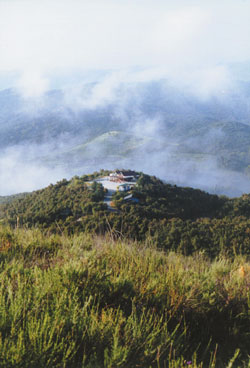


 |
Issue Contents :: Feature :: Being A Monk :: Page [ 1 2 3 4 ]
After breakfast, what happens?
We clean up, and everyone goes back to his hut. We meet again at about 5 p.m.
And during the day?
Mostly it's meditating. Some reading. I limit myself to two hours of writing.
There's no bed in your hut, just a mattress that you roll out every night. There's also a computer and printer. Do you get e-mail?
No, but one of our supporters set up a web site: http://here-and-now.org/watmetta.html.
You said that people here gather together at 5 p.m. Is that for Happy Hour?
It's a question and answer period for visitors. Then people have free time until 8:00, when we have a chanting session, which lasts about 20 minutes. Then there's an hour of group meditation and usually a Dhamma talk [the teaching of the Buddha].
 Do you spend any of your meditation time reflecting on what you'll say?
Do you spend any of your meditation time reflecting on what you'll say?
Very little. The Forest tradition places a lot of emphasis on concentration practice, getting the mind to stay with one object. So that's a lot of my time. And of course, if you're sitting for long periods of time, pain is going to come up. Then the mind creates issues about the pain. Dealing with that is the Buddha's First Noble Truth: There is pain in life. There is suffering in life. I think the reason he focused on that is that if you sit with your pains and suffering, if you have the tools of concentration and mindfulness, you start seeing these issues in your mind.
How is that different from therapy?
The purpose of therapy, Freud said, was to take neurotic individuals and return them to an ordinary level of unhappiness. The purpose of meditation is to take you from that ordinary level of unhappiness to a place where there is no unhappiness and no suffering.
Do the people who come here bring psychological baggage with them?
The monks are a pretty self-reliant group. It's the visitors who come with deeper psychological wounds.
What kinds of questions do visitors ask you?
Oh, everything from meditation questions to relationship questions. How to deal with their kids, how to deal with their parents. How to get out of an unhealthy situation. How to maintain one's commitment in a situation that's difficult. "Should I go for that raise, or should I find more time to meditate?" I tend to say, "Take more time to meditate. You don't need that much money."
Almost 30 years ago, you embarked on a path that took you away from the mainstream. You don't commute, you don't have a 9-to-5 job, you don't have credit cards, and you don't have a family. Does the path you've taken limit your ability to deal with the problems people face?
I focus on what I can offer by being outside the rat race. During all those years in Thailand, it was healthy for me to be around people who didn't have typical American neuroses. You get to see your own neuroses writ large because you're the only one in the area who's got them. Until you say, "This is really dumb."
When do you go to bed?
Usually about 11 or 12.
You only get four or five hours of sleep?!
That's plenty. Meditation takes away a lot of the stressful need for sleep.
Do you nap?
In the late afternoon.
Many people see Buddhism as anti-pleasure: no drinking, no drugs, no debauchery. These are a few of my favorite things. Do you ever miss them?
The biggest loss for me was classical music. I was hooked on classical music. When I got stoned and listened all those years ago, that was my idea of a good time.
When I began to meditate, I'd start getting into these states where I felt the same sense of rapture I got from a really good performance of classical music. I thought, "Oh my gosh, I can get this sensation just by sitting here and breathing." In the past I had to worry about my stereo and if my records would get scratched. I needed all that stuff around just to get a pleasure fix.
Next Page >>